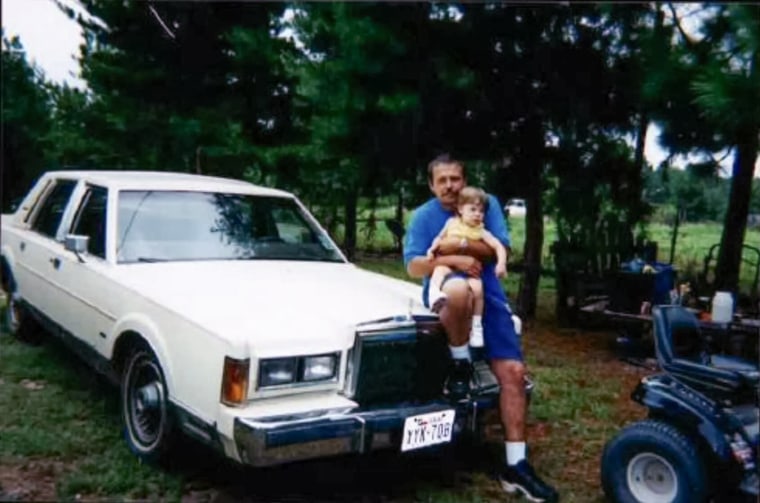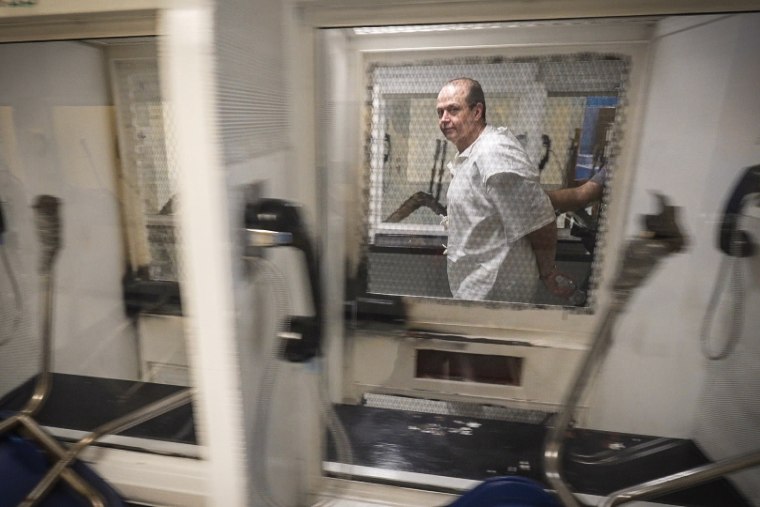Texas is preparing to put a man to death Thursday in what would be the nation’s first execution involving a case of “shaken baby syndrome,” a diagnosis that has been re-evaluated in more recent years, leading to the overturning of similar convictions.
Robert Roberson, who is scheduled to die by lethal injection at 6 p.m. local time at the Texas State Penitentiary at Huntsville, has maintained his innocence after his 2-year-old daughter died in 2002.
The execution could still be delayed if either Gov. Greg Abbott grants his legal team’s request for a 30-day reprieve or the U.S. Supreme Court intervenes.
On Wednesday, the Texas Board of Pardons and Paroles unanimously declined to recommend clemency to Abbott, who has the authority to commute death sentences. The board did not immediately explain why it came to that decision, and Abbott has not shared publicly what he might do.
Roberson’s attempts to appeal his conviction or at least halt his execution have been unsuccessful, with the Court of Criminal Appeals again rejecting a request Wednesday.
A bipartisan coalition of state lawmakers has rallied to support Roberson; they held a hearing Wednesday that included testimony from medical experts and a retired lead detective in the case who has since become an advocate for his release.
“This is an innocent man, beyond question,” Brian Wharton, the former detective, told state lawmakers.
In an interview from prison with NBC News anchor Lester Holt this month, Roberson, 57, urged Abbott to pardon him because “I’m innocent.”
“Look at the support I’ve got, Mr. Governor, and I’m just hoping, praying that you do the right thing,” he said.
Roberson has steadfastly asserted his innocence in Nikki’s death after doctors and law enforcement quickly decided she was killed as a result of a violent shaking episode.
Prosecutors argued that Nikki must have been shaken to death because she had been diagnosed with “the triad” — a swollen and bleeding brain and retinal hemorrhaging — symptoms once believed to be indisputable evidence of shaken baby syndrome.
However, since Roberson’s conviction in 2003, the science behind the triad’s being the sole diagnosis of abuse has come under intense scrutiny.
In 2009, the American Academy of Pediatrics changed the name of shaken baby syndrome to the more broadly defined “abusive head trauma” to include injuries caused by mechanisms other than shaking alone.
It is now medical consensus that other medical conditions, including infections, accidental trauma and pre-existing illnesses, can also cause the symptoms associated with shaken baby syndrome.
Hundreds of possible shaken baby and abusive head trauma cases are reported to hospitals in the U.S. every year, according to a nonprofit advocacy group. While there have been criminal cases involving such injuries, leading to convictions, scrutiny of the medical testimony has also resulted in reversals: Since 1992, at least 34 defendants were later exonerated in connection with allegations of shaken baby syndrome or abusive head trauma, according to the National Registry of Exonerations, which tracks sentences for wrongful convictions.

Roberson said that early Jan. 31, 2002, he awoke to a “strange cry” in his East Texas home and found his daughter, Nikki, had fallen out of bed. He comforted her, and the family went back to sleep, according to court documents.
But hours later, Roberson said, he woke up and realized Nikki was not breathing and her lips looked blue. He took her to an emergency room, where doctors concluded she was exhibiting signs of brain death. The next day, she was pronounced dead.
Roberson showed little emotion at the hospital, which furthered law enforcement’s suspicions. Within a day, Wharton, the Palestine police detective, arrested Roberson on a capital murder charge.
Wharton testified against Roberson at his trial. Prosecutors highlighted that they believed Roberson intentionally shook Nikki, causing bruising and blunt force trauma, and that he appeared almost emotionless when he took her to the hospital.
Roberson has attributed his “seemingly blank reaction” to autism spectrum disorder, which he was diagnosed with in 2018. In addition, his defense lawyers were not allowed at his trial to have a medical expert testify about his claims of “mental lapses” caused by a brain injury.

The jury also never heard the extent of how sick Nikki was from the day she was born, nor that she had been to the hospital more than 40 times in her short life. Two days before she died, she registered a 104.5-degree fever at the doctor’s office. She was sent home with a medication that has since been deemed too dangerous for children — a drug that now carries a “black box warning” from the Food and Drug Administration.
Texas nearly executed Roberson in 2016, but the process was halted days before so another evidentiary hearing could be held. Ultimately, his bid for a new trial was rejected last year.
Roberson’s lawyer, Gretchen Sween, said the case has drawn significant support, including from dozens of distinguished scientists and doctors, a bipartisan group of Texas legislators, advocates for parental rights and organizations that support people with autism.
On Wednesday, a petition with more than 116,000 signatures asking Abbott to stop the execution was delivered to his office.









